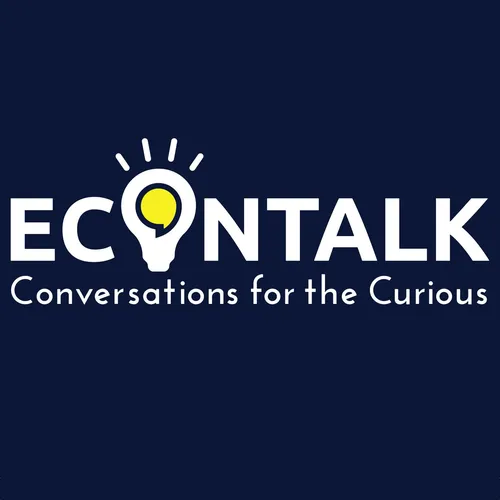
EconTalk
EconTalk: Conversations for the Curious is an award-winning weekly podcast hosted by Russ Roberts of Shalem College in Jerusalem and Stanford's Hoover Institution. The eclectic guest list includes authors, doctors, psychologists, historians, philosophers, economists, and more. Learn how the health care system really works, the serenity that comes from humility, the challenge of interpreting data, how potato chips are made, what it's like to run an upscale Manhattan restaurant, what caused the 2008 financial crisis, the nature of consciousness, and more. EconTalk has been taking the Monday out of Mondays since 2006. All 900+ episodes are available in the archive. Go to EconTalk.org for transcripts, related resources, and comments.
- Update frequency
- every 7 days
- Average duration
- 68 minutes
- Episodes
- 1014
- Years Active
- 2006 - 2025

Lessons from Lincoln, Then and Now (with Diana Schaub)
What lessons can we take from the speeches of Abraham Lincoln for today's turbulent times? How did those speeches move the nation in Lincoln's day? Listen as political scientist Diana Schaub of Loyol…

Reading, Writing, and Fighting (with Mark Helprin)
For many men, surviving the test of battle intensifies the joy of being alive. A provocative claim, perhaps, but to novelist Mark Helprin, simply a fact, and one that drives his new book about men wh…

Is Israel Occupying the West Bank? (with Eugene Kontorovich)
To international law expert Eugene Kontorovich of George Mason University, all the arguments that make Israel out to be an occupying force collapse under the weight of a single, simple fact: A countr…

René Girard, Mimesis, and Conflict (with Cynthia Haven)
If you're always imitating others or aspiring to be something else, what's left of the "authentic" you? According to the French philosopher René Girard, not much: Nothing can be truly authentic, he a…

Does Market Failure Justify Government Intervention? (with Michael Munger)
Economics students are often taught that government should intervene when there is market failure. But what about government failure? Should we expect government intervention to outperform market out…

How the Constitution Can Bring Us Together (with Yuval Levin)
Can a document unify a nation? Yuval Levin of the American Enterprise Institute and author of American Covenant argues that the Constitution unified the United States at the founding of the country a…

Injustice and the "Letter from Birmingham Jail" (with Dwayne Betts)
When poet, lawyer, and MacArthur Fellow Dwayne Betts was imprisoned for nine years at the age of 16 for carjacking, he only wept twice. One of those times was when he read Martin Luther King Jr.'s "L…

The Good, the Bad, and the Ugly of the Covid Vaccine (with Vinay Prasad)
The Covid vaccine saved many lives but so many mistakes were made in how public health officials discussed it, implemented it, and assessed its effectiveness. Epidemiologist Vinay Prasad of the Unive…

Purpose, Pleasure, and Meaning in a World Without Work (with Nicholas Bostrom)
If you didn't have to work to enjoy material abundance, would you do it anyway? If an algorithm or a pill could achieve better results, would you bother shopping or going to the gym? These are the ki…

Glenn Loury Tells All
Economist and social critic Glenn Loury talks about his memoir, Late Admissions, with EconTalk's Russ Roberts. In a wide-ranging and blunt conversation, Loury discusses his childhood, his at-times br…

Living with the Constitution (with A.J. Jacobs)
What does it mean to live Constitutionally in the year 2024? For a start, it means getting off social media. It also means swapping a quill pen for your keyboard, and candlelight for electricity. And…

The Top EconTalk Conversations of 2023 (with Russ Roberts)
The favorite EconTalk episodes for host Russ Roberts are when he and his guest have an unusually powerful connection such as his recent episode with Charles Duhigg, and the ones where he learns somet…

Seeking Immortality (with Paul Bloom)
Would an AI simulation of your dead loved one be a blessing or an abomination? And if you knew that after your own death, your loved ones would create a simulation of you, how would that knowledge ch…

When Prediction Is Not Enough (with Teppo Felin)
If the Wright Brothers could have used AI to guide their decision making, it's almost certain they would never have gotten off the ground. That's because, points out Teppo Felin of Utah State Univers…

Rituals Without Religion (with Michael Norton)
While religion may play less of a role in many people's lives, rituals--the lifeblood of religion--remain central to the human experience. Listen as Michael Norton of the Harvard Business School expl…

A User's Guide to Our Emotional Thermostat (with Adam Mastroianni)
Can you be too happy? Psychologist Adam Mastroianni talks with EconTalk's Russ Roberts about our emotional control systems, which seem to work at bringing both sadness and happiness back to a steady …

What Does "Unbiased" Mean in the Digital World? (with Megan McArdle)
Listen as Megan McArdle and EconTalk's Russ Roberts use Google's new AI entrant Gemini as the starting point for a discussion about the future of our culture in the shadow of AI bias. They also discu…

Voices from Gaza (with Ahmed Alkhatib)
Ahmed Fouad Alkhatib spent much of his childhood in Gaza before becoming an American citizen. He has lost dozens of family members and both his childhood homes in Israel's war in Gaza. But he hasn't …

Living with Exponential Change (with Azeem Azhar)
The world of today would seem alien to someone living 30 years ago: people seduced by their screens in private and public and now AI blurring the lines between humans and the machine. Author and tech…

How to Avoid Lying With Statistics (with Jeremy Weber)
There's often a gap between the textbook treatment of statistics and the cookbook treatment--how to cook up the numbers when you're in the kitchen of the real world. Jeremy Weber of the University of…